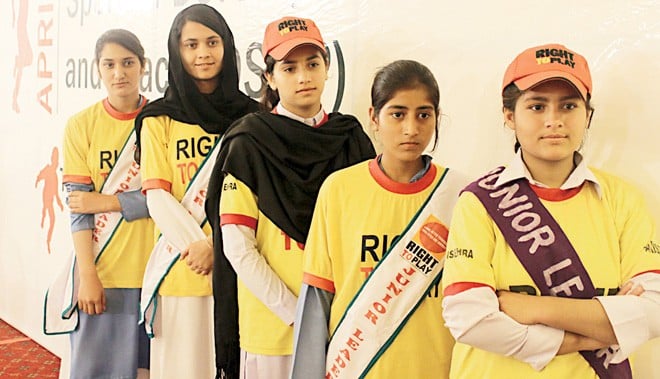

New dimensions of the power of sport came to fore when young footballers from the marginalised areas of Karachi returned home after clinching what was a well-deserved third position in the Street Child World Cup in Brazil.
The 6th of April -- the day they beat US for the bronze medal -- was also significant as the UN Office on Sport for Development & Peace (UNOSDP) celebrated the first-ever International Day on Sport for Development & Peace.
Interestingly, April 6 was the day when the first Modern Olympic Games began, in 1896. Sports Development Foundation (SDF) and Right to Play International (RTP) jointly organised a seminar in Islamabad to highlight the importance of this vital day.
Islamabad, the capital of Pakistan, usually remains overwhelmed by the power of politics, but April not only brought blooming spring to the city but also gave birth to this newer dimension of sport.
Unfortunately, the hooligans leave no opportunity to kill the happiness of my countrymen that sports bring to them. The 3rd March blast at Islamabad’s sessions courts occurred only a day after Pakistan’s convincing victory over India in the Asia Cup.
I still remember the morning of 3rd March when everyone was entering the office with rejuvenated smiles, hugging each other and congratulating friends on that memorable victory.
The morale of the nation was high but the evil minds and hidden hands were sharper. Media broke the news of an explosion in the court and the national celebration gave way to national mourning.
The same thing happened on the 8th and the 9th of April, when state enemies targeted the Sukkur railway station and the fruit and vegetable market of Islamabad, thus giving a clear message that the happiness brought by these poor, marginalised, but resilient, boys will not be allowed to stay long.
But these blood hounds are unaware of the resilience of this nation, which despite all odds has the courage to smile. They are unaware of the story of schoolgirl Kainat from Mansehra, who is now a junior leader in the Right to Play programme.
These miserable creatures who are bent upon spreading despondency don’t know about the story of a junior leader named Musa Aamir, who represented the country in Youth Leadership Sports Camp in Tokyo a couple of months ago.
They don’t know that how lives of millions of people have been and are being transformed through the power of sport in Congo, Lesotho, Kenya, Somalia, Tanzania, Zambia, Uganda, and Sri Lanka.
They may not realise for the time being that power of sport is more potent than the power of gun powder.
I am certain that if we invest more in grassroots sport development programmes like RTP and SDF, and the government realises their importance, there is no reason why we cannot produce more Kainats and Musas to face the challenges of the modern world.
I have attended numerous seminars, but this seminar on Sport for Development and Peace was altogether a breathtaking experience. The flavour was added by Pakistan’s hockey star and Olympian Mansoor Ahmed, academicians, policy makers and leading figures from the civil society. But the real spirit at the seminar were the students, young and aspiring leaders and the parents, who came from far-flung areas of the country to acknowledge the power of sport in transforming the lives of their wards.
They were indeed critical of the government policies on sport and education, but were thankful to the organisations like RTP and SDF, which despite limited resources are trying their best to promote sports at the grassroots level.
Iqbal Jatoi, the Country Manager of Right to Play, highlighted the role of sports in the achievement of MDGs and development of life skills.
He also read out the statement of Wilfried Lamke, special advisor to the Secretary General of United Nations on Sport for Development initiatives in the entire world.
The difference between sport development and sport for development was explained at length by the speakers. It was elucidated how Nelson Mandela celebrated the victory of South African Springbok rugby team and united the South Africans despite being brutally divided along racial lines.
The role of legendry football player Didier Drogba in bringing normalcy to the Ivory Coast through football was also discussed.
The initiative of Sport for Development and Peace is definitely and very promising. The unpleasant part of the story is the premature warning shots fired by the politicians and policy makers on arrival of street children football team from Brazil.
I am sure that if the government stops spending billions of rupees in useless one-off activities like the Punjab Youth Festival, we can rise in the world of sport.